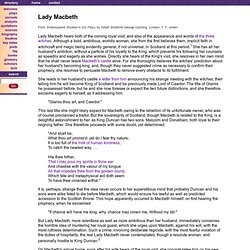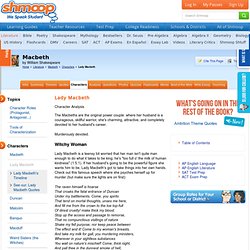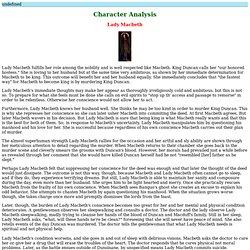

Lady Macbeth Character Study. From Shakespeare Studied in Six Plays by Albert Stratford George Canning.

London: T. F. Unwin. Lady Macbeth hears both of the coming royal visit, and also of the appearance and words of the three witches. Although a bold, ambitious, worldly woman, she from the first believes them, implicit faith in witchcraft and magic being evidently general, if not universal, in Scotland at this period.1 She has all her husband's ambition, without a particle of his loyalty to the King, which prevents his following her counsels as speedily and eagerly as she wishes. She reads in her husband's castle a letter from him announcing his strange meeting with the witches, their telling him he will become King of Scotland and be previously made Lord of Cawdor.
"Glamis thou art, and Cawdor. " This last title she might likely expect for Macbeth owing to the rebellion of its unfortunate owner, who was of course proclaimed a traitor. "If chance will have me king, why, chance may crown me, Without my stir. " He replies. Macbeth: Analysis of Major Characters. Macbeth Because we first hear of Macbeth in the wounded captain’s account of his battlefield valor, our initial impression is of a brave and capable warrior.

This perspective is complicated, however, once we see Macbeth interact with the three witches. We realize that his physical courage is joined by a consuming ambition and a tendency to self-doubt—the prediction that he will be king brings him joy, but it also creates inner turmoil. These three attributes—bravery, ambition, and self-doubt—struggle for mastery of Macbeth throughout the play. Shakespeare uses Macbeth to show the terrible effects that ambition and guilt can have on a man who lacks strength of character. Before he kills Duncan, Macbeth is plagued by worry and almost aborts the crime. Lady Macbeth Lady Macbeth is one of Shakespeare’s most famous and frightening female characters.
The Three Witches. Lady Macbeth and Macbeth. Lady Macbeth in Macbeth. The Macbeths are the original power couple: where her husband is a courageous, skillful warrior, she's charming, attractive, and completely devoted to her husband's career.

Murderously devoted. Witchy Woman Lady Macbeth is a teensy bit worried that her man isn't quite man enough to do what it takes to be king; he's "too full o' the milk of human kindness" (1.5.1). If her husband's going to be the powerful figure she wants him to be, Lady Macbeth's got to take things into her own hands. Check out this famous speech where she psyches herself up for murder (but make sure the lights are on first): The raven himself is hoarseThat croaks the fatal entrance of DuncanUnder my battlements.
Are you thoroughly creeped out? Remind us who the witch(es) are, again? Woman Up In fact, Lady Macbeth's whole "unsex me" speech aligns her with witchcraft and the supernatural (calling on spirits and talking about "smoke of hell" and "murdering ministers" sure sounds witchy to us). Lady Who? Star Performance. Lady Macbeth. Lady Macbeth. Lady Macbeth Character Analysis. Undefined Character Analysis Lady Macbeth Lady Macbeth fulfills her role among the nobility and is well respected like Macbeth.

King Duncan calls her "our honored hostess. " She is loving to her husband but at the same time very ambitious, as shown by her immediate determination for Macbeth to be king. Lady Macbeth's immediate thoughts may make her appear as thoroughly irreligiously cold and ambitious, but this is not so. Furthermore, Lady Macbeth knows her husband well. The almost superhuman strength Lady Macbeth rallies for the occasion and her artful and sly ability are shown through her meticulous attention to detail regarding the murder. Perhaps Lady Macbeth felt that suppressing her conscience for the deed was enough and that later the thought of the deed would just dissipate.
Later, though, the burden of Lady Macbeth's conscience becomes too great for her and her mental and physical condition deteriorates.